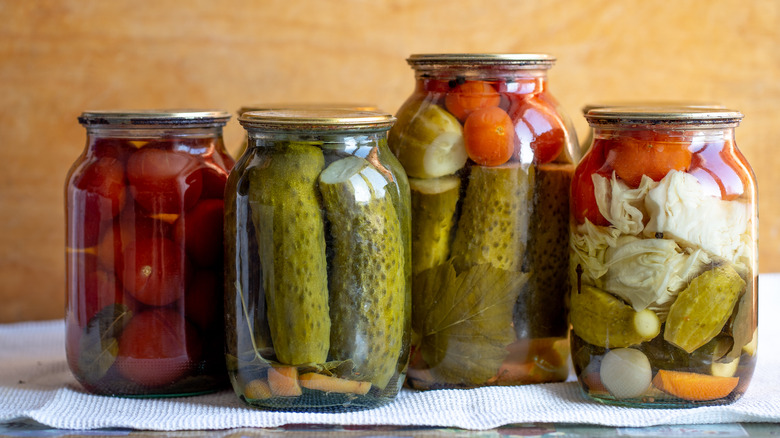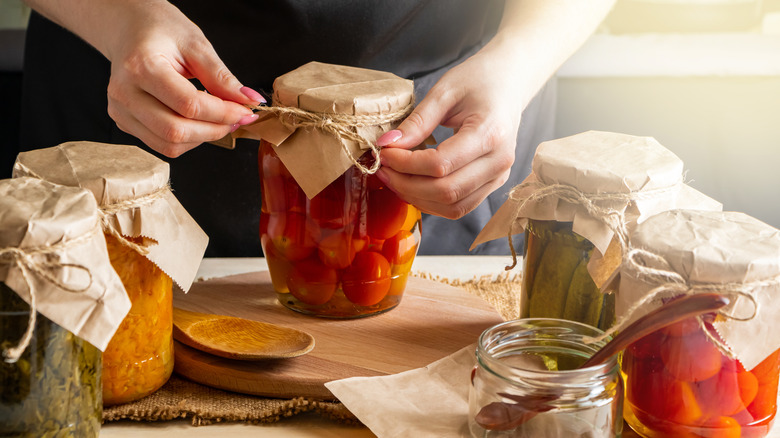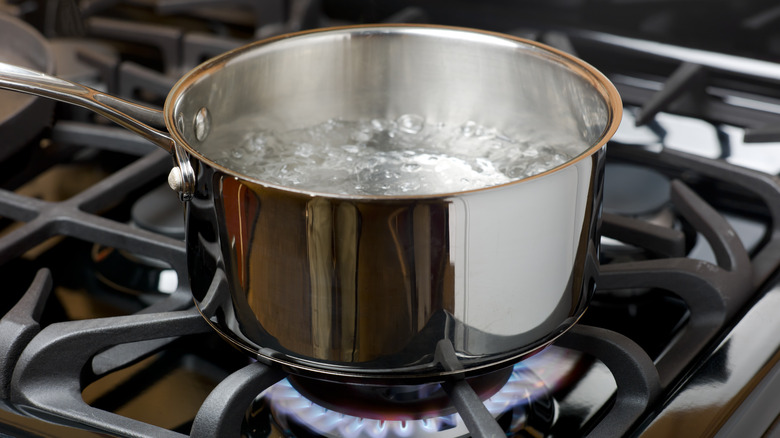The Water Tip To Keep In Mind When Making Home-Canned Pickles
While home-jarred goods may make you think of "Little House on the Prairie" — you certainly don't need to be a homesteader to make pickles. Even those of us living in tiny apartments can make our own crunchy, sour sandwich accompaniments.
Whether you started making pickles as a pandemic activity or you've been doing it for years, you likely know that there are several elements you need to be aware of to make sure each batch comes out crisp and delicious, not to mention safe to consume. Sterilization, acidity levels, and salt quantities can all be make-or-break factors in making homemade pickles, but there's another important quality that you may not have thought of: the quality of your tap water.
Often when we talk about hard vs. soft water, it's in the context of how it affects our hair or our clothes when we shower and do laundry. But pickling is essentially a chemistry experiment that you'll eventually eat, and the mineral content of the water you use can potentially throw the whole project off track. Water that's too hard can keep pickles from curing properly and leave them looking less than appetizing.
The hard knock that is hard water
The hardness or softness of water refers to its mineral content — specifically, how many parts per million it contains of calcium and magnesium. Hard water, despite the vaguely ominous terminology, is generally safe to drink and use for various household purposes. In fact, your body needs these minerals, and very hard water can be a good source of both. Some people dislike the mineral residue that hard water can leave, or the way it interacts with soaps and detergents — and there's plenty of debate about how hard water affects pizza dough and other baked goods. But in general, hard water doesn't really pose a problem for the 85% of Americans who have it (yes, it's that common).
It can become an issue, however, if you're making your own pickles, because the mineral content can mess with the development of acidity in the brine. That acidity is an important part of the curing process, as it's what keeps botulism and other toxins from forming. That's why it's so crucial to use sufficiently acidic vinegar whenever pickling anything. Hard water can also cause some cosmetic issues, like a hazy, slightly opaque-looking brine, and shrunken, wrinkled, unusually dark pickles. For best results, use soft water that's had the minerals filtered out.
Hard water gone soft
Of course, you could always buy bottled, distilled water which has already had its mineral content removed, but lugging home gallons of water every time you want to ferment something can quickly become a pain. You can save yourself a little bit of money and heavy lifting by softening your tap water yourself before using it to make pickles.
Fortunately, it's not at all difficult, it just requires some advance planning. To turn hard tap water soft, all you have to do is keep it at a rolling boil for 15 minutes, then let it sit for a full 24 hours at room temperature. By the end of that time period, mineral solids will gather at the bottom of the pot. Just gently pour the softened water into another container so you don't disturb the mineral solids, this way you're leaving the residue in the pot. Then you can use your homemade soft water, and discard the mineral solids.
Pickling your own cucumbers and other vegetables is a relatively easy weekend activity — and if you grow them yourself, it's a great way to enjoy the yield of your labor all year long. Just do your best to eat them within three months of popping open the jar, because believe it or not, pickles can indeed go bad.


